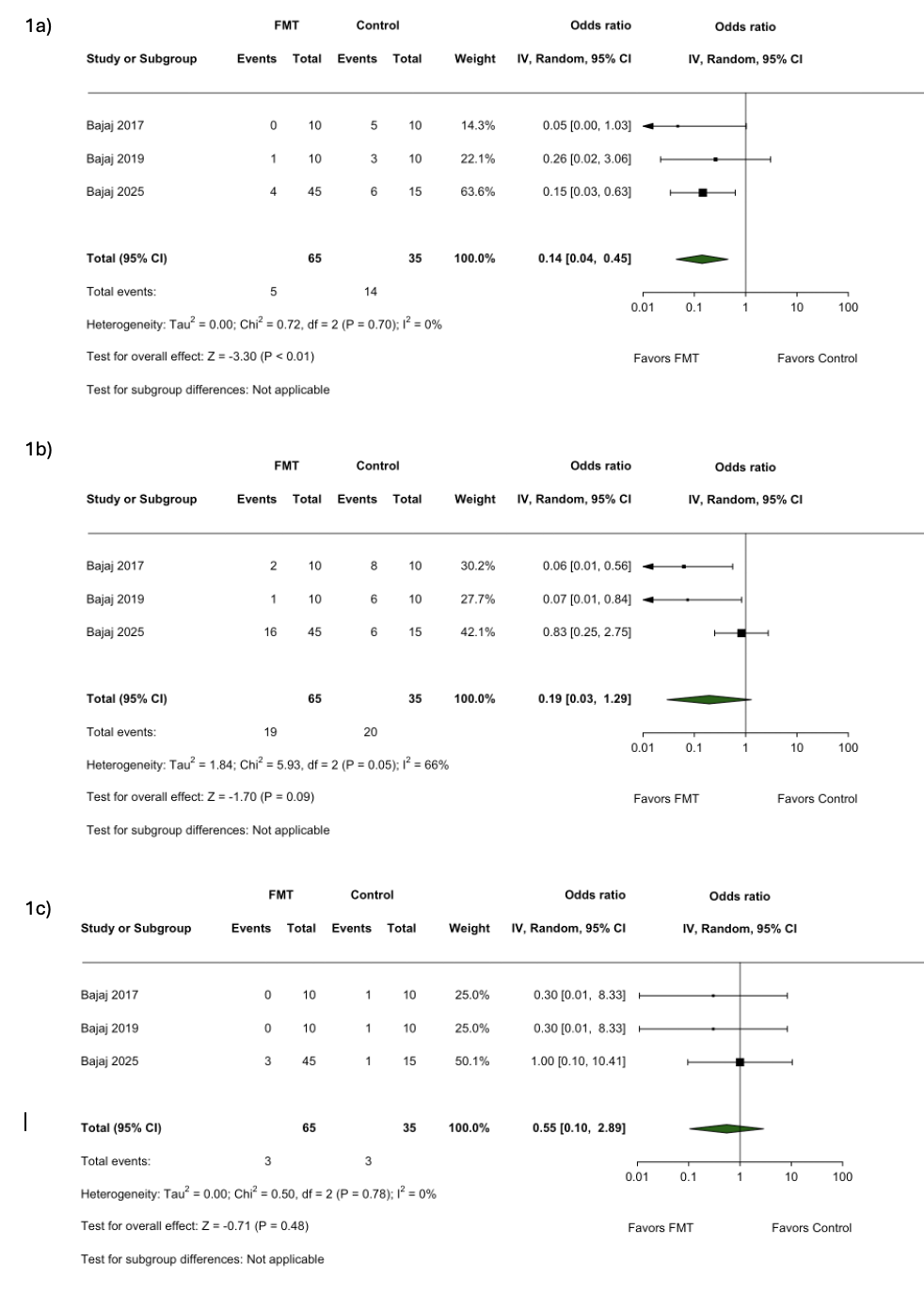Monday Poster Session
Category: Liver
P3717 - Fecal Microbiota Transplantation for Hepatic Encephalopathy: A Meta-Analysis of Clinical Outcomes
Monday, October 27, 2025
10:30 AM - 4:00 PM PDT
Location: Exhibit Hall

Samreen Jawaid, MD
Indiana University School of Medicine
Indianapolis, IN
Presenting Author(s)
Samreen Jawaid, MD1, Tarek G.. Aridi, MD1, Eleazar E.. Montalvan-Sanchez, MD2, Umer Bhatti, MD3
1Indiana University School of Medicine, Indianapolis, IN; 2Yale University School of Medicine, New Haven, CT; 3Indiana University, Indianapolis, IN
Introduction: Hepatic Encephalopathy (HE), a serious complication of cirrhosis, is associated with gut microbiome dysbiosis resulting in cognitive impairment. Standard of care (SOC) treatments, including lactulose and Rifaximin, are often ineffective with a high recurrence rate and irreversible brain injury. Some studies have shown that fecal microbiota transplants (FMT) may restore gut microbial balance and improve patient outcomes. This meta-analysis evaluates the impact of FMT on HE recurrence, hospitalization, and mortality.
Methods: Studies were identified from PubMed, Scopus, and Web of Science from inception to present. Only original studies comparing FMT with SOC amongst adults with confirmed cirrhosis with recurrent HE defined as at least two documented episodes requiring therapy, on lactulose and rifaximin, and MELD ≤ 17 were included. The primary outcome was to assess the safety of FMT by measuring serious adverse events, including HE recurrence, hospitalization, and mortality.
Results: A total of 174 titles were identified through databases. After screening abstracts, 9 full text were assessed for eligibility, of these 3 studies met the inclusion criteria. Baseline characteristics of included studies are summarized in Table 1. All studies enrolled patients with recurrent HE on standard therapy (lactulose and rifaximin), with a median age of 56.2-59 years, and a mean MELD scores between 14-17. FMT was administered via enema or oral capsules, with follow-up periods ranging from 5 to 12 months. FMT significantly reduced HE recurrence (OR 0.14, 95% CI 0.04-0.45, p< 0.01). Given that earlier studies were not blinded randomized controlled trials, the reduced hospitalization trend (OR 0.19, 95% CI 0.03-1.29, p=0.09) is questionable. Mortality did not significantly differ between groups (OR 0.55, 95% CI 0.10-2.89, p=0.48). (Figure 1)
Discussion: FMT shows strong effectiveness for HE prevention without significant mortality impact. These findings support FMT as a promising adjunctive therapy. However, the modest sample size and limited number of studies highlight the need for multi-centre trials to confirm efficacy, assess safety and determine optimal delivery of FMT in cirrhosis related HE.

Figure: Table1: Baseline characteristics of included studies.

Figure: Figure 1: Forest plots demonstrating the effects FMT on (a) HE recurrence, (b) Hospitalizations, and (c) Mortality.
Disclosures:
Samreen Jawaid indicated no relevant financial relationships.
Tarek Aridi indicated no relevant financial relationships.
Eleazar Montalvan-Sanchez indicated no relevant financial relationships.
Umer Bhatti indicated no relevant financial relationships.
Samreen Jawaid, MD1, Tarek G.. Aridi, MD1, Eleazar E.. Montalvan-Sanchez, MD2, Umer Bhatti, MD3. P3717 - Fecal Microbiota Transplantation for Hepatic Encephalopathy: A Meta-Analysis of Clinical Outcomes, ACG 2025 Annual Scientific Meeting Abstracts. Phoenix, AZ: American College of Gastroenterology.
1Indiana University School of Medicine, Indianapolis, IN; 2Yale University School of Medicine, New Haven, CT; 3Indiana University, Indianapolis, IN
Introduction: Hepatic Encephalopathy (HE), a serious complication of cirrhosis, is associated with gut microbiome dysbiosis resulting in cognitive impairment. Standard of care (SOC) treatments, including lactulose and Rifaximin, are often ineffective with a high recurrence rate and irreversible brain injury. Some studies have shown that fecal microbiota transplants (FMT) may restore gut microbial balance and improve patient outcomes. This meta-analysis evaluates the impact of FMT on HE recurrence, hospitalization, and mortality.
Methods: Studies were identified from PubMed, Scopus, and Web of Science from inception to present. Only original studies comparing FMT with SOC amongst adults with confirmed cirrhosis with recurrent HE defined as at least two documented episodes requiring therapy, on lactulose and rifaximin, and MELD ≤ 17 were included. The primary outcome was to assess the safety of FMT by measuring serious adverse events, including HE recurrence, hospitalization, and mortality.
Results: A total of 174 titles were identified through databases. After screening abstracts, 9 full text were assessed for eligibility, of these 3 studies met the inclusion criteria. Baseline characteristics of included studies are summarized in Table 1. All studies enrolled patients with recurrent HE on standard therapy (lactulose and rifaximin), with a median age of 56.2-59 years, and a mean MELD scores between 14-17. FMT was administered via enema or oral capsules, with follow-up periods ranging from 5 to 12 months. FMT significantly reduced HE recurrence (OR 0.14, 95% CI 0.04-0.45, p< 0.01). Given that earlier studies were not blinded randomized controlled trials, the reduced hospitalization trend (OR 0.19, 95% CI 0.03-1.29, p=0.09) is questionable. Mortality did not significantly differ between groups (OR 0.55, 95% CI 0.10-2.89, p=0.48). (Figure 1)
Discussion: FMT shows strong effectiveness for HE prevention without significant mortality impact. These findings support FMT as a promising adjunctive therapy. However, the modest sample size and limited number of studies highlight the need for multi-centre trials to confirm efficacy, assess safety and determine optimal delivery of FMT in cirrhosis related HE.

Figure: Table1: Baseline characteristics of included studies.

Figure: Figure 1: Forest plots demonstrating the effects FMT on (a) HE recurrence, (b) Hospitalizations, and (c) Mortality.
Disclosures:
Samreen Jawaid indicated no relevant financial relationships.
Tarek Aridi indicated no relevant financial relationships.
Eleazar Montalvan-Sanchez indicated no relevant financial relationships.
Umer Bhatti indicated no relevant financial relationships.
Samreen Jawaid, MD1, Tarek G.. Aridi, MD1, Eleazar E.. Montalvan-Sanchez, MD2, Umer Bhatti, MD3. P3717 - Fecal Microbiota Transplantation for Hepatic Encephalopathy: A Meta-Analysis of Clinical Outcomes, ACG 2025 Annual Scientific Meeting Abstracts. Phoenix, AZ: American College of Gastroenterology.
